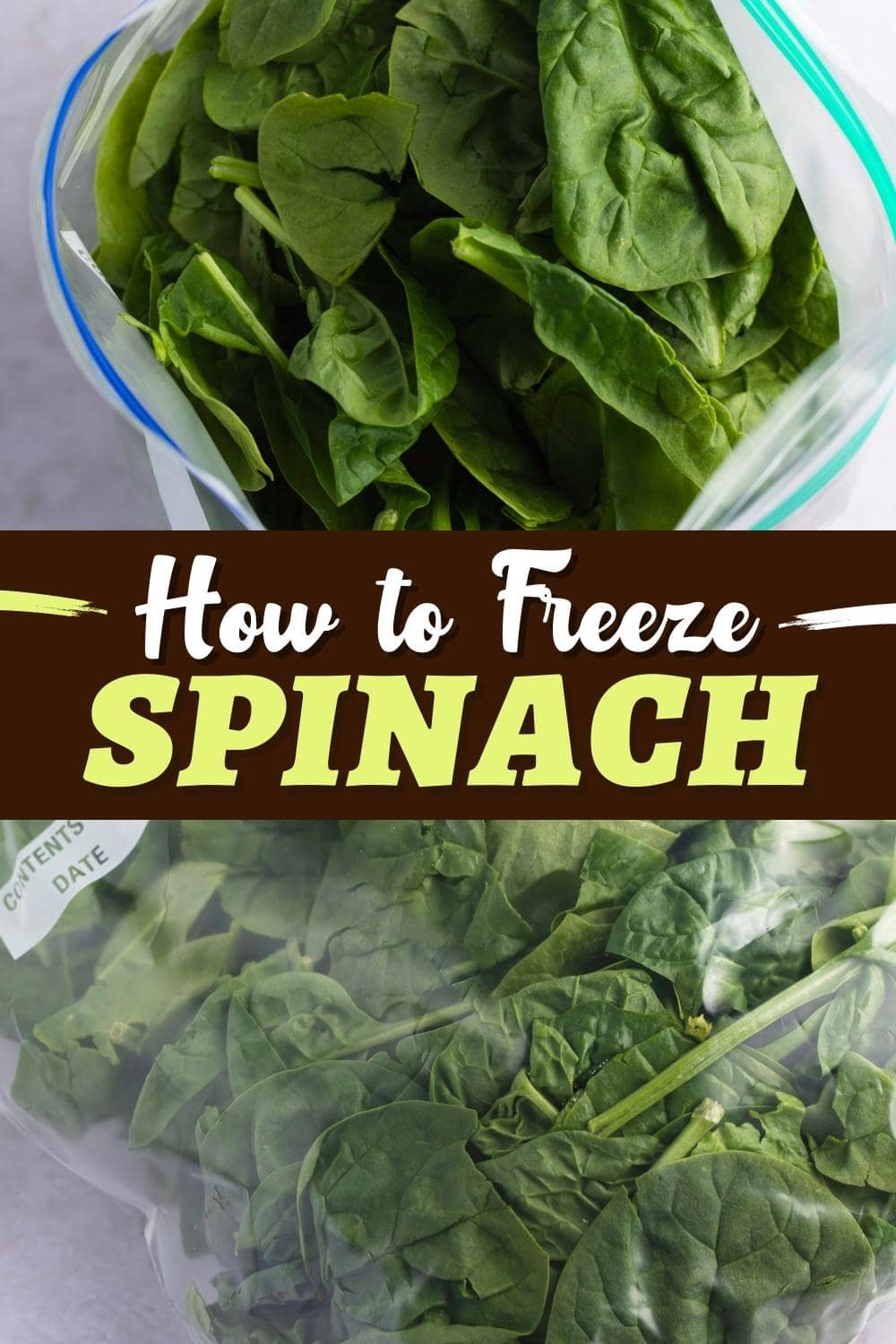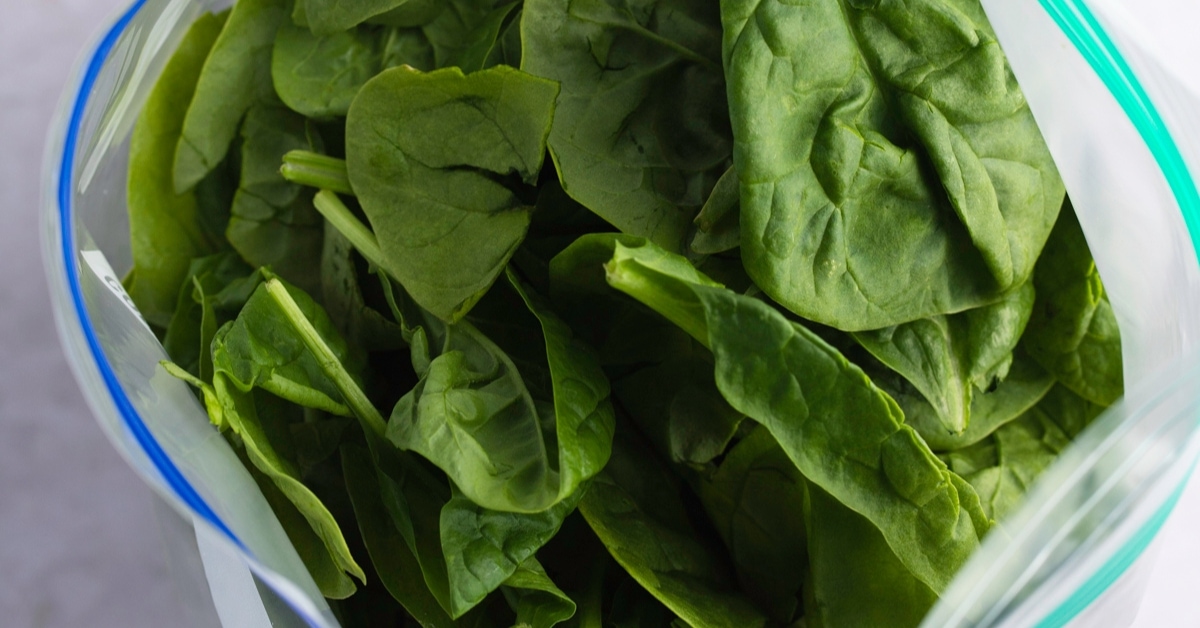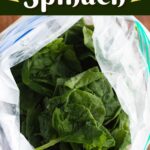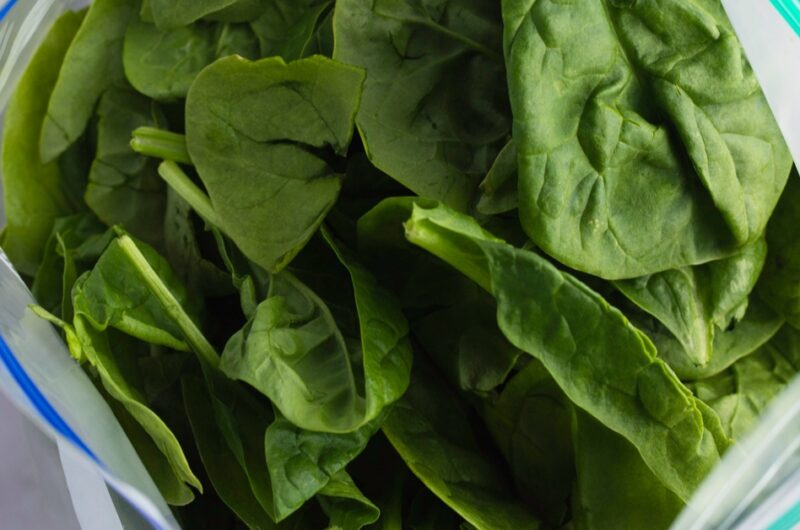If you’re looking for a guide on how to freeze spinach, you’ve come to the right place.
Below, I’ll show you all the tips and tricks to freezing the leafy greens successfully!
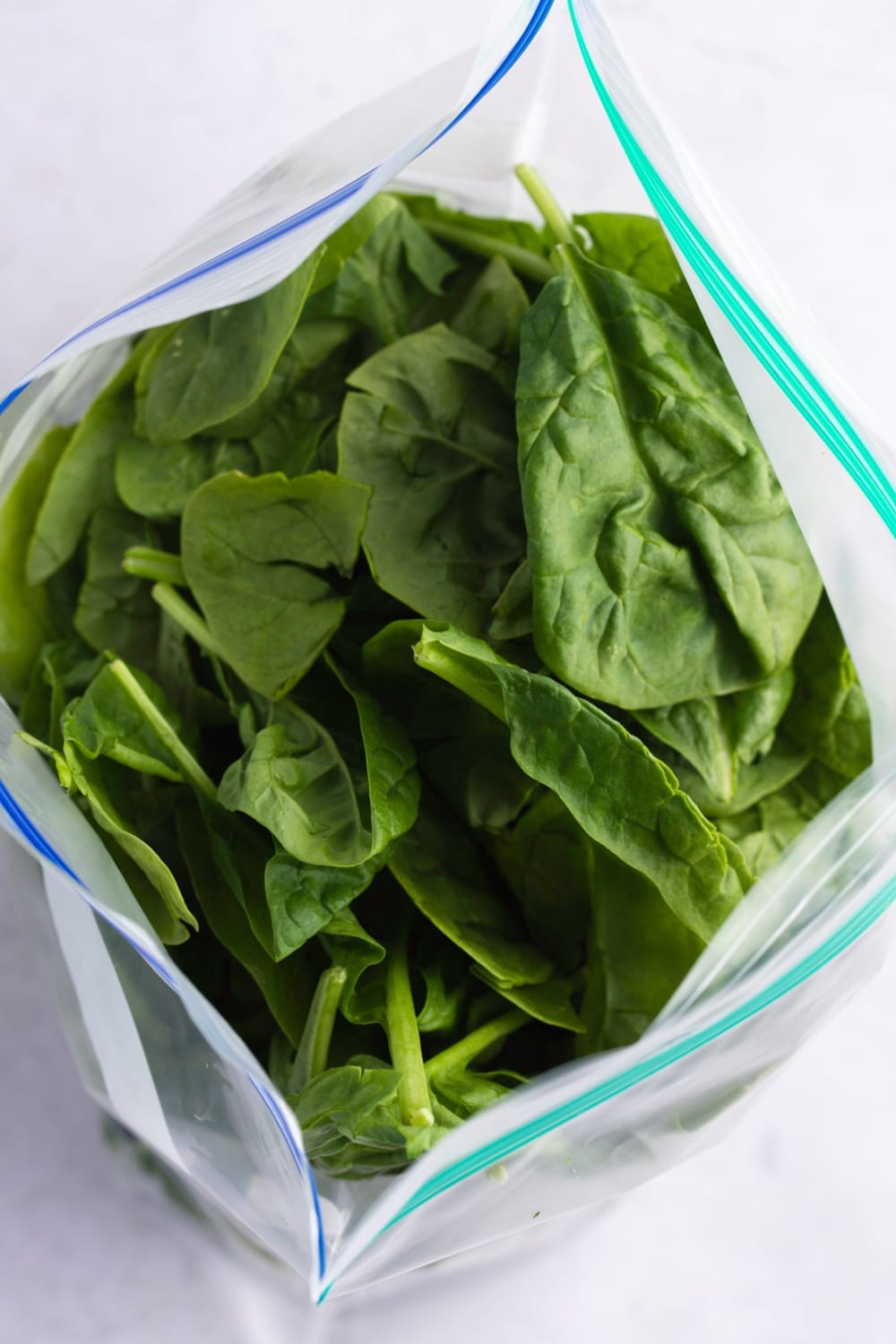
Have you ever been a little too optimistic about your weekly health goals and bought a huge pack of spinach?
Or maybe your local grocery store had a door-buster deal on the leafy vegetable you couldn’t resist?
I’ve been there too.
That’s why freezing is such a great option! It saves on food waste and it means you’ll always have healthy greens on hand when you need them.
So, here’s the ultimate guide that will teach you how to freeze spinach.
Can You Freeze Spinach?
The short answer is, you absolutely can! You can freeze anything if you put your mind to it.
The real question comes down to whether or not you can freeze spinach well.
If you just toss some leaves in the freezer and hope for the best, you’re probably not going to get the result that you want.
You have to do some homework if you want to achieve the perfect frozen spinach, and luckily, I did that job for you!
Frozen spinach retains more flavor than canned spinach and is easier to cook with as well.
Plus, the leaves compress when they’re iced, so you can pack a lot more into your smoothie or soup.
This allows you to get more of the key vitamins and nutrients that spinach is famous for.
And it eliminates the hassle of trying to stuff in half a container of leafy greens.
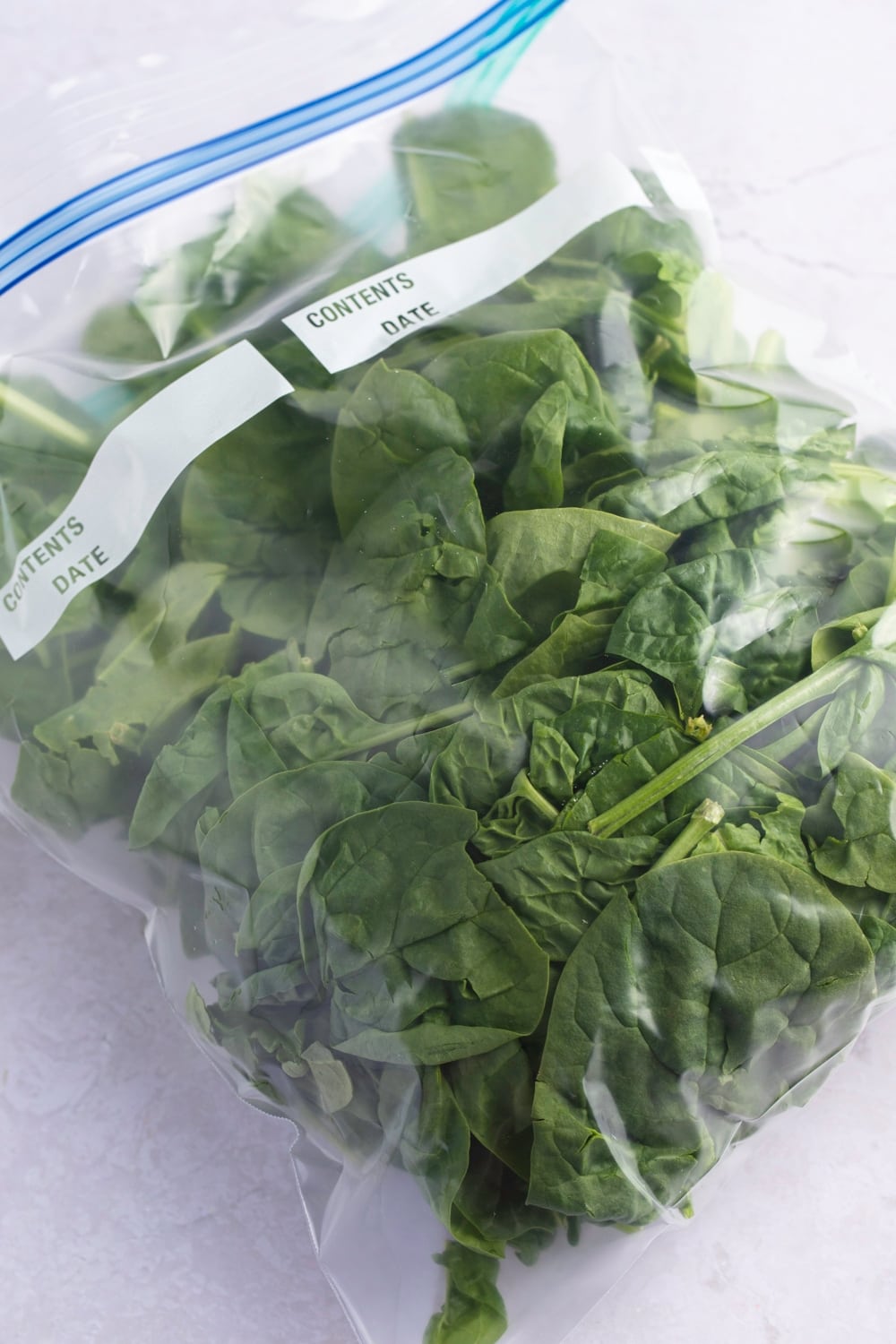
How to Freeze Spinach?
There are a few different ways you can freeze spinach, and each has its own pros and cons.
Each person has their own preference, but here are the three main methods to do the deed.
Freezing Blanched Spinach
This method takes a bit longer, but if you want to stockpile frozen greens for longer than 3 weeks, then this is the best way.
If you do it right, frozen blanched spinach can last up to 3-6 months! That’s a long time to have some spinach on hand.
The only downside to this method is that blanching can often remove a lot of the key vitamins.
Boiling any vegetable can be detrimental to nutrition, so keep this in mind when deciding which method to choose.
Method:
- Quickly blanch fresh spinach in a pot of boiling water
- Let it cook for 60 seconds
- Transfer the spinach to a bowl of iced water
- After about a minute, strain the spinach and leave it to drip or spin it in a salad spinner
- Finally, squeeze excess liquid from the leaves then place them in a freezer-safe bag or container
- Freeze for 3-6 months
Freezing Pureed Spinach
This method requires a bit more cleanup than the previous method, but the result is so worth it.
And it’s the best option if you use spinach in smoothies, soups, or sauces. That’s because the spinach is more like a liquid when thawed so it’ll blend well.
It’s not ideal, however, for salads or sandwiches.
Method:
- Clean the spinach leaves and remove any long stems
- Place the spinach in a food processor with a small amount of water
- Pulse the leaves until they reach the desired consistency
- Pour the puree into ice cube trays for easy portioning
- Freeze for 1-2 months
Freezing Whole Spinach Leaves (Preferred Method)
This method is definitely the easiest out of the bunch (no pun intended).
It requires very little effort and only uses a freezer bag and some lung power to suck out the air.
I mean, how can it get any easier than that?
Method:
- Wash and clean the spinach leaves, then cut off any long stems
- Pat the leaves dry or spin them in a salad spinner
- Layer the leave in a freezer-safe bag and press to remove excess air
- Freeze for 3-6 months
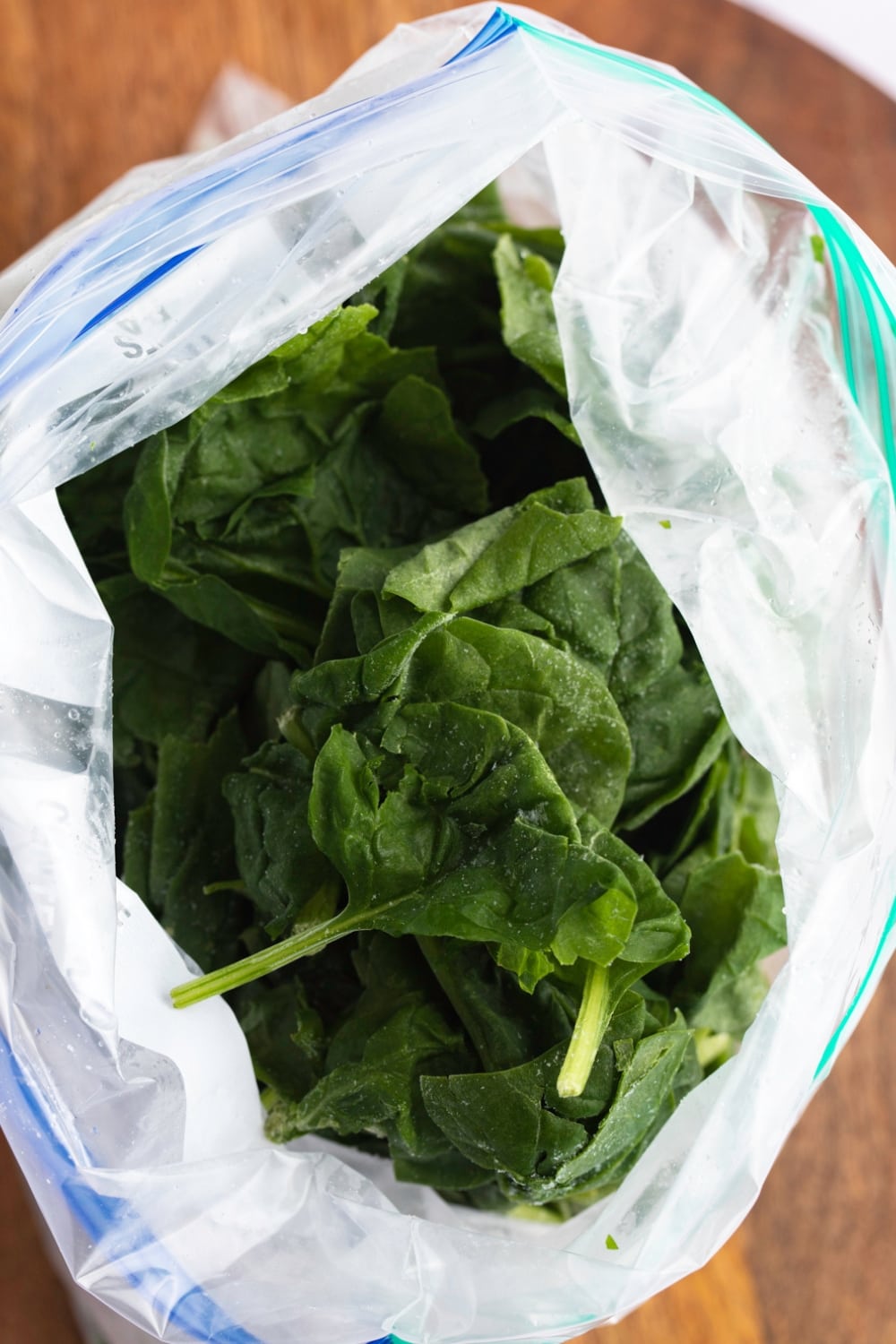
Tips for Freezing Spinach
Here are some tips and tricks to freezing spinach:
- 5oz of spinach will wilt down to about 1 cup for freezing:
- This can be an easy mistake to make when deciding how much to freeze.
- Think about how much spinach can wilt in when sauteeing, similar rules apply to freezing.
- There is no need to thaw the spinach before adding it to soups or sauces:
- Unlike meat, (which almost always needs thawing before cooking), most frozen veggies should not be thawed out, spinach included.
- Thawing can cause the frozen veg to lose some of its texture and become mushy during cooking.
- Save the cooled cooking water from blanching the spinach
- Where do all the nutrients go when you boil a vegetable? It’s commonly believed that the water retains some of the lost vitamins when blanching.
- The cooking water also has some spinach essence, making it a great base for cooking grains to give it that slight earthy taste.
What to Make With Frozen Spinach
The beauty of frozen spinach is that you can practically use it in anything your heart desires!
Spinach is such a versatile ingredient that adds a little oomph to anything it touches.
The only drawback with using the thawed greens is that you can’t use them in salads, but everything else is fair game.
From pastries to pasta, frozen spinach can do it all!
Frozen spinach is perfect for sneaking in some greens into your kid’s diet.
I find that freezing spinach beforehand helps remove some of the bitter flavor that kids detest.
I personally love using it in a spinach artichoke dip, or as a topping for pizza.
